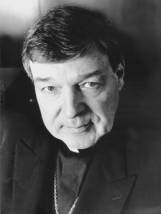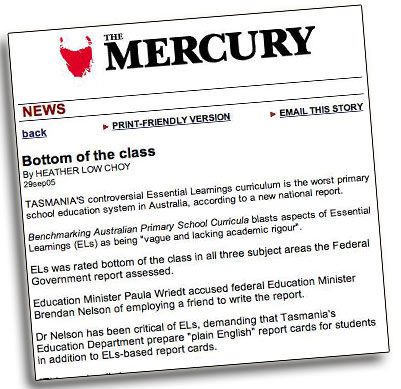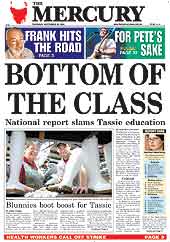|
 Watch Southern Cross TV's Sophie Murphy's Report About Essential Learnings!
Watch Southern Cross TV's Sophie Murphy's Report About Essential Learnings!
An Alarming Attempt Is Being Made To Hijack Public Education Philosophy...

by
Dr Andrew Corbett,
President ICI College Australia and Lecturer in Ethics and Contemporary Issues,
Worldview Centre for Intercultural Studies
It was Abraham Lincoln who said that what
was taught in the classroom of one generation was legislated in the halls
of government in the next generation. There are many philosophies (ideas)
about educating children. Some ideas promote the transfer of information
as the basis of educating children. On the other hand, there are ideas which
promote the undirected, unprepared, unguided, minimal-supervision approach
to educating children. Fads in educational philosophy come and go. But currently
there is a very concerning and potentially dangerous new philosophy seeking
to gain preeminence in our public education system.
Th e Rise of Relativism... e Rise of Relativism...
At
a recent National Press Club luncheon (Sept. 21st 2005), Cardinal George
Pell delivered a
very articulate summary of what may be one of the most intellectually
dangerous ideas to enter our national classrooms: relativism.
He succintly showed that relativism is invading the thinking of Western minds
and soon runs the risk of removing time-honoured boundaries of social standards-
Cardinal Pell said that contemporary
educational institutions have led to what Pope Benedict XVI called the "dictatorship of
relativism." He attacked the trends in which "great works of literature
and the study of history are dismissed as elitist," saying that the practical
result of that approach is to "dismantle the sense of objective reality."
Catholic World News
In my home state of Tasmania, relativism has been described as "ELs" (Essential
Learnings). Only now are many parents and teachers realising that despite
the glossy leaflets and brochures, ELs is fundamently flawed and quite possibly
even potentially dangerous! Cardinal Pell specifically pointed out what was
happening currently in the Tasmanian education system as a prime example of
what happens when relativism takes over.
The trend has apparently gone furthest in Queensland, Western Australia
and Tasmania, and I am aware that N.S.W. Board of Studies syllabuses prescribe
these authors.
Of course there are always rationalisations for why school syllabuses
are manipulated in this way. The official website of the Tasmanian school
syllabus explains that the objectives of critical literacy are to enable
students to "deconstruct the structures and features of texts", to overcome
the assumption that "texts [are] timeless, universal or unbiased",
to understand the "unequal positions of power" that texts often
present, and in this way to "work for social equity and change".
It is all meant to be very "empowering".
Cardinal George Pell
http://www.sydney.catholic.org.au/Archbishop/Addresses/2005921_1181.shtml
Cardinal Pell pointed out that the attack on objective educational
standards has a clear political motivation. The post-modern approach
to education, he said, "proposes to make students into agents of social change." The
modernist curriculum, he charged, undermines age-old beliefs about "family,
sexuality, maleness, femaleness, parenthood, and culture," and to "normalize
moral and social disorder."
Catholic
World News
Educational Relativism says-
- No answer is wrong
- Truth is relative (subjective)
- Assessment is non-objective
- Teachers are not to direct learning, rather they are to facilitate enquiry.
 While this might sound warm and appealing, it is grossly inadequate as an
educational philosophy since it does not reflect how the real world operates.
In the real world a red light means stop. Any other answer a person gives is
irrelevant (and quite possibly life-threatening). While this might sound warm and appealing, it is grossly inadequate as an
educational philosophy since it does not reflect how the real world operates.
In the real world a red light means stop. Any other answer a person gives is
irrelevant (and quite possibly life-threatening).
Relativism states with absolute certainty that we can not be absolutely certain
about anything! That's why relativism is self-defeating and illogical.
Some people have read the stated outcomes of this type of curriculum where
postitive words are employed such as, "integrated learning", "inquiry based",
"holistic", "spiritual well-being" and thought this was a very nice curriculum.
But as we dig a little deeper, we discover that firstly, these kinds of statements
which are badged under "new" and "innovative" imply that traditional standards-based
learning did not achieve these ideals. Most experienced teachers will tell
that this is just simply not the case. Secondly, each of these concepts come
laden with certain values. For example, how do we 'integrate' the study of
human reproduction into other academic fields without addressing morality
and ethical guidelines? And in doing this, what level of respect will sexual
abstinence be given in a secular curriculum?
Of course, advocates for a Relativistic Curriculum would argue that their
New Age curriculums do explore morality and ethics. Within the ELs
curriculum it plainly states that one of its objectives is to arrive at a set
of ethical guidelines "which transcends religious, cultural
or societal differences." While this sounds reasonable, it is going to
be an almost impossible task for the entire State Schooling system to achieve
let alone an entire school or even a classroom, without somebody's ethical
framework prevailing.
Dr. John Roulston, the Executive Director of The Association of Independent
Schools of Queensland, is perhaps responding to this dillemma when he gives
a reason why so many parents are now choosing to send their children to a Christian
school-
...parents choose a Christian school to give their children a clear moral
and ethical educational framework for life as responsible citizens.
"WHICH CHRISTIAN SCHOOL, 2006", page 3
 As
Christians who believe in the principle of public education, where knowledge
is not dichotimised into religious or secular, we have had to be increasingly
on guard to ensure our children are inculcating right values. We have been
blessed by the quality of teachers our children have had throughout their public
education. But we have also adopted an attitude that any teacher is only there
to help us, as parents, to educate our children. As
Christians who believe in the principle of public education, where knowledge
is not dichotimised into religious or secular, we have had to be increasingly
on guard to ensure our children are inculcating right values. We have been
blessed by the quality of teachers our children have had throughout their public
education. But we have also adopted an attitude that any teacher is only there
to help us, as parents, to educate our children.
We believe that the parenting role
is essentially an educative one as much as it is a nurturing one. I don't
know of any parent who uses a curriculum (other than home-schoolers) yet as
parents we almost intuitively teach age-appropriately and with fact-transmission.
That is, rather than merely waiting for our children to "inquire" about their
knowledge-gaps, most parents almost intuitively seek to help their children
add to their body of knowledge before their
children "inquire". We also do this in a way that complements inquiry- that
is after supplying our children with information. Most parents then also
encourage further investigation once this foundation of factual knowledge
has been layed.
But what parents do intuitively is discouraged within a relativistic educational
curriculum adopted by the Tasmanian Education Department. As my wife, a qualified
Primary School teacher, has pointed out- "subjective teaching leads to subjective
evaluation". Without a definite set of standards to be taught and then used
as the criteria for evaluation, parents and pupils have no objective measure
of what they are learning. This becomes critical if we want our children to
be able to interact with others, perhaps beyond our borders, as intellectual
peers. There is therefore, good anthropological reasons why we need standardised
(objective) curriculums and assessments.

As intellectually fragile as Academic Relativism is, it moves from fragility
to dubious when it attempts to redefine "spiritual health" as being attainable
without (at best) any religious awareness or (at worse) a relationship with
God. This may well be why The Australian Newspaper (front page, 29th September
2005) describes these types of curriculums as "New Age Curriculums". Is it
therefore any wonder that parents and teachers who believe in objective standards,
moral absolutes, and the sacredness of the spiritual are reacting so strongly
to their State Education Departments pushing these Relativistic New Age Curriculums?
DO CHRISTIANS HAVE SOMETHING TO SAY
ABOUT THE TEACHING OF SPIRITUALITY?
When I began raising some of these concerns among the Christian community,
one of the responses I received was a query as to whether Christians
had a right to impose our standards onto a secular system. Its curious
that this type of concern is a new one. It wasn't that long ago
when Christian ideals and values were ubiquitous (universally common)
in Western societies. This included the Law, Media, Politics, and Education.
In fact, one could quickly build a case for each of these aspects of
society originating ut of Christianity.
Doctrinal preaching is largely out of vogue within the modern church.
We are yet to fully realise the price of this neglect. But the next
generation of believers will not be able to use our maxed-out-doctrinal-credit-card
so easily. With the trend toward "How To..." theology becoming
the most popular form of preaching today, we are generally abdicating
our role as guardians of the truth (1Tim. 3:15) if we do not challenge
Relativism.
so that we may no longer be children, tossed to and fro by
the waves and carried about by every wind of doctrine, by human cunning,
by craftiness in deceitful schemes.
Eph. 4:14
This was the foundational-text for which Cardinal George Pell constructed
his argument for Christians taking a stand against Relativism. In a world
of anti-discrimination it is all too easy to carry the notion of equality
beyond human worth and dignity and into arenas where it should not venture.
Most particularly is the arena of ideas. While all people are equal in
worth and dignity, the same cannot be said of all ideas. While it may
be politically correct to say that everyone is entitled to their idea,
it is sometimes prophetically-correct to challenge some ideas! Something
that too few of us are yet to attain is exactly how we do this without
simultaneously looking like we are attacking the one promoting those
ideas. That's why people like Greg Habermas really impress me. He would
publically debate atheists like Prof Antony Flew on university campuses
and conclude the debate by inviting Prof Flew out for a meal so he could
get to know him better! After months of these debates and a growing friendship
between the two men, Antony Flew abandoned his Relativistic worldview
for a Theistic worldview. This helps to prove that as Christians we can
make our point for objective truth in a courteous and respectful way.
WHAT WE CAN DO...
As Christians we need to be a people who accept
responsibility. If we allow to go unchallenged the idea of Relativism
we will make our task of sharing the greatest news mankind could ever hear,
potentially unintelligible to the modern Western hearer. We therefore need
to challenge Relativistic Philosophy. I hope that this can happen in everyday
conversation with those we dialogue with. Perhaps the best strategy in this
regard is to turn Relativism back on itself with some simple questions. Since
Relativism says that every idea is equal (and therefore no-one's ideas are
wrong) perhaps some Relativistic sentences help to show why it is self-defeating-
* "I cannot speak or write one word in English."
* "No sentences are more than three words."
* "All religions are true."
* "We can be absolutely certain that there is
no absolute certainty about anything."
These Relativistic statements should be immediately recognised by most as
self-defeating. Perhaps as Christians we also need to examine what we believe
to see whether there are Christians with other legitimate ideas which are different
to ours and then determine whether it is possible to distinguish opinion from
truth. At the very least though, Christians should be able to point out to
our society why some ideas are inferior without simultaneously making the promoters
of those ideas feel the same way.
 Andrew
Corbett, 1st October 2005 Andrew
Corbett, 1st October 2005
|